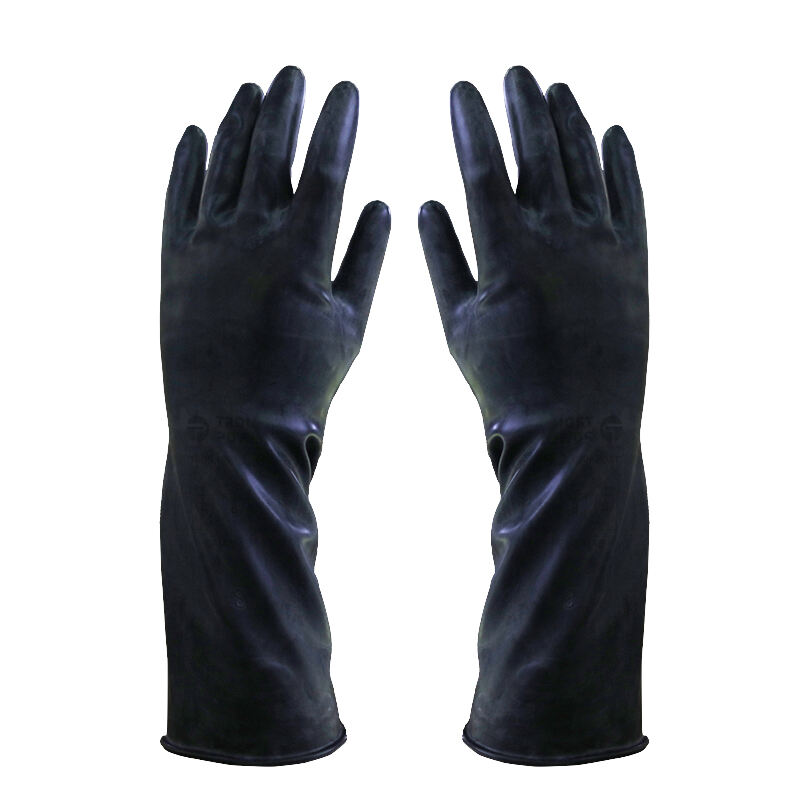
| Product Series/SKU | TRON 1000 Chemical/BV2014S8 |
| Material | Butyl / FKM |
| Color | Black |
| Hand Shape Design | For Left and Right Hands |
| Thickness | 20mil/0.5mm |
| Surface | Smooth |
| Cuff | Cuff Roll |
| Length | 14inch/350mm |
| Cuff Roll | 3-5ml |
| Size Options | 8/M |
| Standard |
EN ISO 21420: 2020 EN 388: 2016+A1:2018 EN ISO 374-1: 2016+A1:2018 EN ISO 374-5: 2016EN 421: 2010 |
| Packaging | 1 pair per sealed plastic bag;48 bags per shipping carton |
TRON 1000 butyl/fluororubber gloves offer comprehensive protection against harsh chemicals like ketones and benzene in industrial, lab, and spray settings, ensuring safety and flexibility even in low temperatures.
The TRON 1000's innovative butyl/FKM design offers supreme, broad-spectrum chemical protection in one glove—ideal for complex multi-chemical environments and professionals who value maximum safety and efficiency.
Q1: What chemicals are these gloves primarily resistant to? Can they replace the nitrile gloves I currently use?
A: That's a key question! The TRON 1000 is specifically engineered to protect against ketones, esters, and strong acids (like sulfuric and nitric acid). Compared to common nitrile gloves, it offers far superior performance against these specific chemicals. If your work primarily involves ketone solvents (e.g., acetone), esters, or high-concentration inorganic acids, switching to these gloves will provide a safer, more professional level of protection.
Q2: You mention "high seal effectiveness." What is the practical benefit of this?
A: High seal effectiveness is a unique advantage of butyl rubber. It means the gloves are more effective at blocking the permeation of toxic vapors and gases. For instance, when handling highly volatile ketone solvents or concentrated acids, they offer superior respiratory protection compared to standard gloves, making them ideal for use in poorly ventilated or confined spaces.
Q3: In low-temperature environments (like a cold storage room), will the gloves become stiff and difficult to work with?
A: This is another standout feature of the TRON 1000. Even at low temperatures, the butyl rubber remains highly flexible and will not stiffen like PVC or nitrile gloves. This ensures reliable finger dexterity and grip strength when working in cold storage areas, maintaining both safety and work efficiency.
Q4: Are these gloves suitable for extended wear?
A: These gloves are unlined, prioritizing tactile sensitivity and flexibility. They are excellent for short to medium-duration tasks requiring precise handling. For continuous heavy-duty work lasting several hours, a lined version might be preferable for enhanced comfort. The core value of the TRON 1000 is providing top-level protection for medium to short-duration, high-risk chemical handling operations.
Q5: Which industries or job functions are these gloves best suited for?
A: They are particularly ideal for scenarios such as:
Chemical & Pharmaceutical Industries: Handling ketones, esters, or strong acids during material charging, equipment cleaning, and pipeline maintenance.
Laboratories: Using solvents like acetone or ethyl acetate for sample processing or instrument cleaning.
Electroplating & Metal Treatment: Exposure to high-concentration pickling solutions and electrolytes.
Environmental Remediation: Disposing of waste containing relevant chemicals.